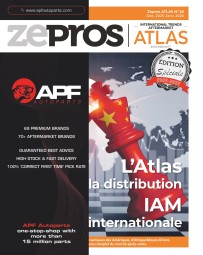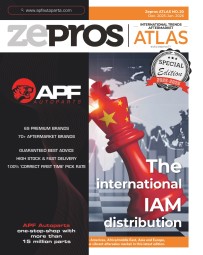
Parts Holding Europe: “The ageing of the vehicle parc is an opportunity, but also a challenge”
Parts Holding Europe is prudently continuing to develop its European coverage. On the roadmap: no expansion into new countries, but a reinforcement of the positions gained. For the time being… Stéphane Antiglio, CEO, and Jeremy de Brabant, managing director, reveal their vision and strategy.
Jeremy de Brabant: For the full year, we expect to maintain the same trend as in the first half, with growth of 7%. This is quite satisfactory considering the current environment. For the second half of the year, the trend is for a slowdown in business in France and the Benelux countries. On the other hand, Italy and Spain remain buoyant markets.
Stéphane Antiglio: This growth is essentially organic, with gains in market share. Indeed, we have not made any major acquisitions recently, but rather bought out small structures in Belgium and Spain at the end of 2023, which contributed to turnover in the first months of 2024. We'll now have to wait and see whether the slowdown we've seen in the second half of the year is a blip or an underlying trend.
J. de B.: It also illustrates that when companies join the group, a development plan is deployed and it works. We support them and invest in inventories and/or logistics. In Italy, for example, we have made three major logistics investments: in Naples, Padua and Milan. We also have logistics projects in Spain, where we have significantly expanded our mechanical and bodywork ranges. These are additional means of winning over new customers and improving customer service for our companies. In addition, we have made a number of one-off investments in IT development.
S. A.: When we enter a country, it's not to make up the numbers, it's to be No. 1 or No. 2! This is the case in all the countries where we operate, with the exception of the Netherlands. Having strong positions doesn't mean we don't need to reinforce them, as we're about to do in Spain. To enter a new country, you need to find the right point of entry! Every acquisition must be successful, creating value and growth for the acquired structure. This is the case for our companies in Naples - which has doubled in size - and Padua, but also for our Spanish businesses, which are posting impressive growth rates. Of course, we are looking at other countries, but we always carefully select our acquisition projects on the basis of very rational criteria and cultural aspects. Our aim is not to plant flags just to fill a map.
J. de B.: We leverage synergies wherever possible. This is the case with our Spanish structure Grup Eina, whose services we use in the Benelux countries, Italy and France. However, we are not dogmatic, and we respect local intelligence and the culture of our companies. Our Autossimo digital catalogue could also be offered on other markets. On one condition: this solution must add value over and above that of the solution that companies are already using. There's no urgent need to break up what already exists!
S. A.: The AD banner has been rolled out in Belgium, and could be reactivated in Italy and expanded in Spain. Synergies can also come into play in logistics. The optimisation and automation systems of our French Logisteo and Bremstar hubs can be a source of inspiration for our foreign partners. And of course, purchases are negotiated and globalised at European level, but also on a country-by-country basis to respect the structure of each market. We are not obsessed with replicating concepts identically, but rather with adding value: if solutions seem to be appropriate for the country, we do them, and if they seem premature, we wait. It's always a question of timing.
S. A.: The inconsistent policies in support of electric vehicle sales and now the penalties that threaten manufacturers who do not reach the right mix will not encourage them to sell many more cars, and they could even restrict certain models... All this will contribute to accelerating the ageing of the vehicle fleet. On the whole, this is a good thing for the independent aftermarket. On the other hand, there are also consequences, with a fleet of old cars and the issue of the maintenance-repair budget.
S. A.: We have all the resources. But the question of sourcing parts for older vehicles could arise if certain manufacturers stop producing certain components. However, aftermarket entrepreneurs are seizing the opportunity to fill these ‘gaps’ in the range, enabling us to find the missing families... but not all of them. The ageing of the fleet is therefore both an opportunity and a challenge. It's crucial to offer prices that are compatible with the residual value of the vehicle. We anticipate that the parc will continue to age by four to six months a year over the next few years.
S. A. : Yes. And the situation is also complicated for equipment manufacturers, especially those who have invested heavily in new technologies such as electrification. There is talk of orders and projects being cancelled, particularly in the battery sector. Electrification, which was supposed to help rejuvenate the fleet, will remain chaotic for some time to come.
J. de B.: It's true that more and more manufacturers and dealership networks are showing an interest in the independent aftermarket. We are also seeing a reduction in the number of service outlets in these networks. The coverage is declining in France, Italy, Benelux and even Spain.
S. A.: This trend is inevitable, as new vehicle sales fall and an increasing number of players and brands. Manufacturers have sound economic reasons for streamlining their networks. And this runs in contradiction to demand from motorists, who want service close to home. Yet another point in favour of the independent aftermarket! In France, we have two excellent Autodistribution independent distributor partners who also have a dealership business; the same goes for Doyen's API brand. And let's not forget that our shareholder (D'Ieteren Group) is a major new vehicle distribution group in Belgium! This proves that there is a clear fit.
J. de B.: With parts suppliers, acquisitions and/or spin-offs are long-term approaches. We are constantly in discussions with people who might be interested in selling their business. But these are long-term issues.
S. A.: However, the distribution sector will continue to consolidate gradually. That's the way the story goes. For our part, we remain active... And then there are also the concession groups, which are major consolidators.








